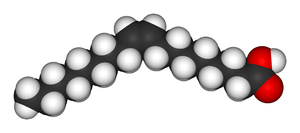Elaidinization
Elaidinization is a chemical reaction which alters the orientation of double-bonds from cis- to trans-. It is most often performed on fats and oils to increase both the melting point and the shelf life without reducing the degree of unsaturation. The typical product of elaidinization is trans fat.
Etymology
The word originates from elaidic acid, the trans-isomer of oleic acid.
Reaction
Elaidinization of oleic acid, a common component of vegetable oils, yields its trans-isomer elaidic acid.
| Oleic acid | Elaidic acid |
|---|---|
| Oleic acid is a cis unsaturated fatty acid, a common component of natural vegetable oils. | Elaidic acid is a trans unsaturated fatty acid often created by partial hydrogenation or elaidinisation of vegetable oils. |
 |
 |
 |
|
| These fatty acids are isomers (chemically identical except for the orientation of the double bond). | |
gollark: Wow, 3rd in the world!
gollark: =wolf UK government debt
gollark: Budgeting etc. for it probably would take more time than editing the code directly.
gollark: Give budget to replace a few lines of code...? Your company is weird.
gollark: I should start a consulting firm and wildly guess about possible issues with people's code!
This article is issued from Wikipedia. The text is licensed under Creative Commons - Attribution - Sharealike. Additional terms may apply for the media files.